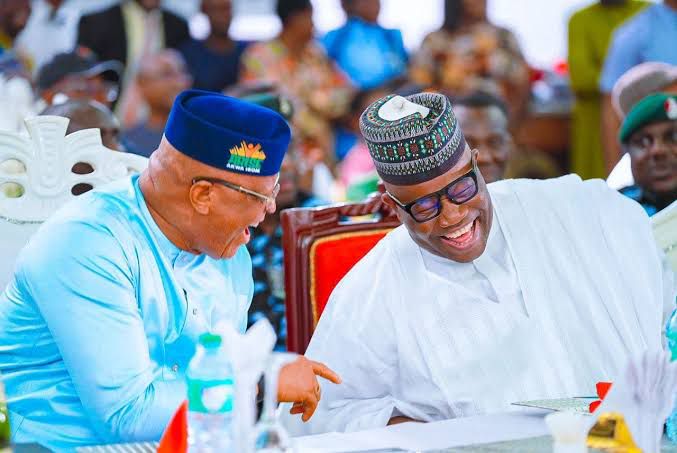In the aftermath of the recent local government elections held in Akwa Ibom State on October 5, 2024, Patrick Odey delves into the political intricacies and controversies following the surprising victory of the All Progressives Congress (APC) in Senate President Godswill Akpabio’s home region, Essien Udim Local Government Area (LGA). Despite widespread expectations of a comprehensive win for the ruling Peoples Democratic Party (PDP), confusion arose when initial reports leaning heavily in favor of the PDP were quickly countered by a declaration of APC dominance in the local council. The discrepancies ignited discussions and accusations of electoral manipulation, placing the leadership of both parties under scrutiny, particularly as the PDP celebrated its triumph despite what appeared to be electoral misreporting.
A viral video surfaced shortly after the results were announced, featuring Professor Atting, the alleged returning officer for Essien Udim, proclaiming the PDP candidate, Enobong Patrick Friday, had triumphed with a staggering 55,612 votes against the APC candidate, Mr. Ntiedo Usoro Effiong, who received only 686 votes. This announcement set off a chain reaction, leading to outright disbelief among PDP loyalists when official results revealed a starkly different outcome. Quickly clarifying the situation, Akwa Ibom State Independent Electoral Commission Chairman, Mr. Aniedi Abasi Ikoiwak, asserted that the actual winning margin for the APC candidate was 51,751 votes over the PDP’s 22,799, branding the viral claims as unfounded misinformation meant to mislead the public.
The overarching criticism views the PDP’s apparent concession of Essien Udim’s local council as a politically strategic maneuver to safeguard Senator Akpabio from the embarrassment of being defeated in his stronghold. Enobong Friday’s congratulatory message to his APC opponent further fueled speculation about underlying political alliances, suggesting an acknowledgement of the importance of unity in governance over party affiliations. Commentary from political analysts suggests that in allowing the APC to claim victory in what is traditionally a PDP-dominated area, Governor Umo Eno may be courting favor with Akpabio, potentially laying groundwork for future alliances that might reshape the political landscape leading up to the 2027 elections.
Furthermore, as speculation mounts around Eno’s potential defection to APC, prominent PDP figures vehemently deny such intentions, asserting Eno’s commitment to maintaining peace and cooperation among Akwa Ibom leaders. Observers have highlighted Eno’s ability to navigate the complex political dynamics of the state by fostering a conciliatory relationship with Akpabio, which stands in contrast to Akpabio’s historically tumultuous dealings with other state leaders. As the governor aligns with Akpabio through this electoral allowance, political analysts are closely monitoring the ways this collaboration could manifest through mutual agreements, such as the anticipated delivery of developmental projects from Abuja to Akwa Ibom.
The notion of an evolving political alliance was further echoed in discussions during Senate plenary, where Akpabio recognized the improbability of losing in his own territory and commended Eno’s efforts to uphold political civility. Akpabio’s acknowledgment of Eno’s strategic choices has stirred expectations regarding reciprocal political gestures moving forward, coupling the potential alliance with broader implications for the state’s future political strategies. Observers and party insiders are now questioning how this rapprochement will alter the power dynamics leading up to the next set of elections, fueling conversations about mutual support and collaboration across party lines.
However, apprehensions exist, particularly from members of the APC who remind Governor Eno of Akpabio’s record for betrayal within party politics. Unsurprisingly, this skepticism suggests that while the prospect of cooperation may appear promising, past transgressions may loom heavily over any potential alliance. As various stakeholders express their opinions on the current state of politics in Akwa Ibom, reactions range from hopeful optimism regarding potential collaborations to caution in viewing Akpabio’s overtures as genuine or beneficial for Eno or the broader electorate.
As discussions surrounding the outcome of the local elections continue to unfold, it remains unclear how the evolving relationships between the PDP and APC will shape Akwa Ibom’s political future, particularly in the context of the rumored alliance’s ability to bridge party divides. Political maneuvering and strategic alliances will likely play a significant role as Governor Eno and Senator Akpabio navigate this complex terrain, ultimately revealing whether their actions will lead to genuine cooperation or further entrenchment of old rivalries as they head towards 2027. In the interim, it appears efforts are already underway within the PDP to placate disappointed candidates and supporters to maintain stability and support within the ranks, highlighting the ongoing impact of these elections on party dynamics and governance in Akwa Ibom State.


